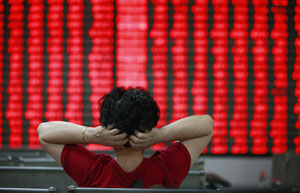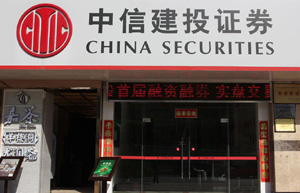A common view in China is that the country's "new phase of economic and social development will certainly bring precious confidence and strong support to the stock market", the news agency said on Sunday. Reports from the People's Daily and China Central Television last month showed how money is flowing into stocks from the property market.
The government said this month it will reduce fees by more than half for individuals and institutions opening share accounts, while the futures exchange cut margin requirements for equity-index contracts on Monday.
Regulators also announced plans to allow investors to consolidate their accounts covering stocks, mutual funds and other securities. The Shanghai Stock Exchange said this week it is hosting presentations by 14 listed banks to improve transparency and cultivate investor relationships.
 |
 |
The China Securities Regulatory Commission did not respond to a faxed request for comment. A Xinhua official said it does not have an office that answers media inquiries.
The combination of bullish coverage from the media and surging demand from local investors did not prevent shares from tumbling five years ago. While the nation's two largest financial newspapers published articles saying the rally would continue and new-account openings surged to an 18-month high in July 2009, the Shanghai Composite lost 23 percent over the next 12 months.
Volatility in Chinese equities now may deter some investors from increasing holdings, according to Credit Suisse Group AG. The Shanghai Composite has posted average annual swings of 44 percent in the past decade, while wealth management products offer annualized returns of about 5 percent.
Yet Chinese stock valuations are still low relative to history, which gives the market room to rally further as the economy improves, said Roxy Wong, a Hong Kong-based senior portfolio manager at Lombard Odier & Cie, which oversees about $169 billion worldwide.
The Shanghai Composite trades at 11 times reported earnings, 24 percent below its five-year average and down from a multiple of 29 in July 2009, according to data compiled by Bloomberg. Data showed China's service industries improved last month, fueling speculation the economy is strong enough to offset declining home prices and a pullback in manufacturing.
China's real estate slump is spurring local investors to shift more of their money into stocks, according to Chen Xingdong, the chief China economist at BNP Paribas SA in Beijing. Signs of increased risk in wealth management and trust products may also make shares an attractive alternative, said Kathy Xu, a Hong Kong-based money manager at Aberdeen Asset Management Plc.
New-home prices fell in July in almost all cities that the government tracks, according to the National Bureau of Statistics. At least 10 Chinese trusts struggled to meet payments in the three months through August, sparking protests by investors outside banks that distributed the products.
Equities comprised 4 percent of Chinese households' total assets as of 2013, according to a June report from Credit Suisse. Bank deposits accounted for about 22 percent while property made up 55 percent.
"You might even start to see retail money redirected to equities after years of chasing real estate," said Michael Shaoul, the New York-based chairman of Marketfield Asset Management LLC, which oversees about $18.5 billion.
